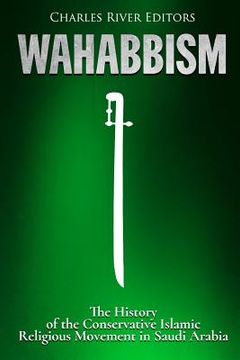Wahabbism: The History of the Conservative Islamic Religious Movement in Saudi Arabia (en Inglés)
Reseña del libro "Wahabbism: The History of the Conservative Islamic Religious Movement in Saudi Arabia (en Inglés)"
*Includes pictures *Includes online resources and a bibliography for further reading In May 2017, President Donald Trump made his first foreign visit, and the first stop was to the Kingdom of Saudi Arabia. According to the then-White House Press Secretary Sean Spicer, "The President's trip will begin in Saudi Arabia, home to the two holiest sites in Islam. He will encourage our Arab and Muslim partners to take bold, new steps to promote peace and to confront those, from ISIS to al Qaeda to Iran to the Assad regime, who perpetuate chaos and violence that has inflicted so much suffering throughout the Muslim world and beyond." For President Trump, this visit signified a step towards not only reaffirming and strengthening alliances in the Muslim world, but also taking the opportunity to explicitly lay out the new administration's approach to dealing with terrorism. During his speech at the Arab Islamic American Summit in Riyadh, Trump stated his pleasure with the opening of the Global Center for Combating Extremist Ideology in Saudi Arabia. What is ironic is that the very same extremist ideology that radical Muslim extremists practice is inspired by the Wahhabi ideology propagated by Saudi Arabia and the surrounding countries in the Arabian Gulf. Nonetheless, the West has maintained a close relationship with the Al-Saud family for nearly two centuries, not only most notably due to Saudi Arabia's oil supply, but also because they have provided a counterbalance against adversaries in the region. Despite this long history, there is speculation that President Trump's approach to extremist ideology will be markedly different from past presidents, and the world was waiting for his speech in Riyadh to confirm this change. In Trump's strong speech, he stated, "As we deny terrorist organizations control of territory and populations, we must also strip them of their access to funds. We must cut off the financial channels that let ISIS sell oil, let extremists pay their fighters, and help terrorists smuggle their reinforcements." Wahhabism is the most common form of politicized fundamentalist Islam, now most associated with the Islamic State and Al Qaeda and the official religion of Saudi Arabia and Qatar. It is widespread throughout the Islamic world, especially in Pakistan and Afghanistan (where it was the official religion of the Taliban). Together, the Saudi and al-Wahhab families formed a potent alliance, with the Saudis gaining an ideological backing for their small state and the Wahhabis gaining a powerful and increasingly wealthy patron. In many ways, their alliance (which still holds strong today) can be seen as the founding moment of the First Saudi state, but regardless, the Wahhabian Saudis expanded their power through much of the 19th century and were well-positioned to take advantage of the collapse of Ottoman power in the wake of World War I. After an indecisive war in 1919, a second conflict in 1925 led to the fall of the Hashemites and Saudi domination of the region. Saudi Arabia's tempestuous relationship with radical Islamic ideology has been a contentious point for the kingdom's relationship with the U.S. and the rest of the Arab world. While their own status as the Custodian of the Two Holy Mosques bestows special status on them and their particular mixture of governance and religion, their inability (or unwillingness) to control the very ideology they laid the foundations for has often been a nuisance over time. Wahabbism: The History of the Conservative Islamic Religious Movement in Saudi Arabia traces the formation of the religious ideology and its influence over the modern Saudi state. Along with pictures of important people, places, and events, you will learn about Wahabbism like never before.

